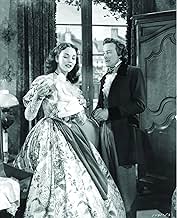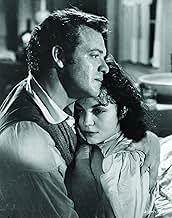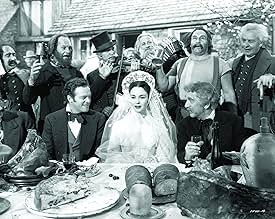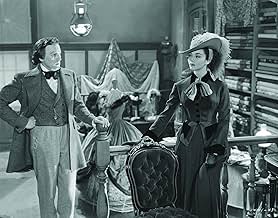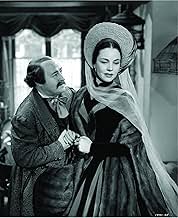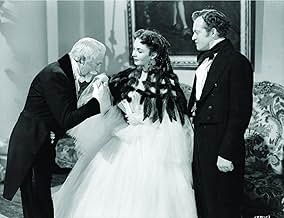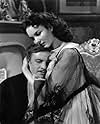VALUTAZIONE IMDb
7,0/10
3131
LA TUA VALUTAZIONE
Le illusioni romantiche della moglie di un medico di provincia sulla vita e sullo status sociale la portano a tradire il suo ingenuo marito, ad assumere amanti e ad accumulare debiti rovinos... Leggi tuttoLe illusioni romantiche della moglie di un medico di provincia sulla vita e sullo status sociale la portano a tradire il suo ingenuo marito, ad assumere amanti e ad accumulare debiti rovinosi.Le illusioni romantiche della moglie di un medico di provincia sulla vita e sullo status sociale la portano a tradire il suo ingenuo marito, ad assumere amanti e ad accumulare debiti rovinosi.
- Regia
- Sceneggiatura
- Star
- Candidato a 1 Oscar
- 2 vittorie e 1 candidatura in totale
Alf Kjellin
- Leon Dupuis
- (as Christopher Kent)
Harry Morgan
- Hyppolite
- (as Henry Morgan)
Recensioni in evidenza
Jennifer Jones is "Madame Bovary" in this 1949 adaptation of Flaubert's novel, directed by Vincente Minnelli and also starring Van Heflin, James Mason, Louis Jourdan, Gene Lockhart, Alf Kjellin and Ellen Corby. The film starts with Flaubert, on trial for indecency. As he defends the book, he tells the story of Emma Bovary, a delusional young woman living on a farm who, from romantic novels, has unrealistic ideas about love and happiness. She nabs a simple country doctor (Van Heflin) and proceeds to buy herself an incredible wardrobe and live as a rich woman, even though she and her husband are not wealthy. She has a little girl whom she ignores, leaving her to the nurse (Corby). Emma soon becomes bored and attempts to seduce a young man (Kjellin), but his mother (Gladys Cooper) catches on and sends him to Paris. Then she meets Boulanger (Jourdan) at a party, becomes his lover and plans to run away with him to Italy - but he sees what high maintenance she is and takes off without her. In an attempt to make her husband more prominent, she attempts to talk him into performing a new surgery, but he refuses (in the book, however, he's ambitious as well and does the surgery, which is a failure). Meanwhile, unbeknownst to her husband, she owes a fortune, and if she doesn't find a way out, the family is due to lose their home and furnishings.
"Madame Bovary" is one of the most stunning films ever made, with a captivating performance by Jones who makes Emma pathetic, desperate, frantic and sympathetic. As one of the comments on the board pointed out, it's easy to make Emma unlikable. With Jones' natural charm making her likable and somewhat sweet, we can see ourselves in Emma. She has great backup from Heflin as her cowed husband. Jourdan is handsome and arrogant - he sees his future with Emma, and he doesn't like it.
Minnelli handles every detail beautifully in this film. Not enough can be said about the waltz at the party, its dizzying effects making it one of the most thrilling scenes on film. When Emma later puts on the same gown and looks in the mirror and remembers that night, we know for her it was the ultimate dream evening, when she become one with the heroines of the novels she read. The gowns - well, there have been beautiful gowns in films - the 1938 Marie Antoinette comes to mind - and, as in that film, these gowns are works of art, particularly the white ball gown. When Boulanger returns from Italy, and Emma goes to see him, she actually looks different - tired and older - the subtlety of the makeup is spectacular.
Though set in France in the mid-1800s, Madame Bovary is a classic because it deals with an ordinary person so dazzled by illusion that she cannot accept anything about her life as it exists. How apropos for today, when the media bludgeons us with multimillion dollar homes, heiresses who go to parties every night, size zero, red carpet premieres - it's hard to be happy when you're a housewife in sweats paying $4 a gallon for gas. Even before films, television, the tabloids and the Internet, people weren't satisfied with their lives because they were told to compare their inside with someone else's outside and found themselves not measuring up.
"Madame Bovary" isn't an immorality tale, it's a morality tale and, of course, Flaubert was acquitted. It's considered one of the two greatest novels ever written, along with Anna Karenina, and it's perfectly adapted for film in the 1949 version - the story of a woman who thinks that shopping on credit till she drops is the way to real happiness. Like many in the 20th and 21st centuries have found, she was wrong.
"Madame Bovary" is one of the most stunning films ever made, with a captivating performance by Jones who makes Emma pathetic, desperate, frantic and sympathetic. As one of the comments on the board pointed out, it's easy to make Emma unlikable. With Jones' natural charm making her likable and somewhat sweet, we can see ourselves in Emma. She has great backup from Heflin as her cowed husband. Jourdan is handsome and arrogant - he sees his future with Emma, and he doesn't like it.
Minnelli handles every detail beautifully in this film. Not enough can be said about the waltz at the party, its dizzying effects making it one of the most thrilling scenes on film. When Emma later puts on the same gown and looks in the mirror and remembers that night, we know for her it was the ultimate dream evening, when she become one with the heroines of the novels she read. The gowns - well, there have been beautiful gowns in films - the 1938 Marie Antoinette comes to mind - and, as in that film, these gowns are works of art, particularly the white ball gown. When Boulanger returns from Italy, and Emma goes to see him, she actually looks different - tired and older - the subtlety of the makeup is spectacular.
Though set in France in the mid-1800s, Madame Bovary is a classic because it deals with an ordinary person so dazzled by illusion that she cannot accept anything about her life as it exists. How apropos for today, when the media bludgeons us with multimillion dollar homes, heiresses who go to parties every night, size zero, red carpet premieres - it's hard to be happy when you're a housewife in sweats paying $4 a gallon for gas. Even before films, television, the tabloids and the Internet, people weren't satisfied with their lives because they were told to compare their inside with someone else's outside and found themselves not measuring up.
"Madame Bovary" isn't an immorality tale, it's a morality tale and, of course, Flaubert was acquitted. It's considered one of the two greatest novels ever written, along with Anna Karenina, and it's perfectly adapted for film in the 1949 version - the story of a woman who thinks that shopping on credit till she drops is the way to real happiness. Like many in the 20th and 21st centuries have found, she was wrong.
Gustave Flaubert's Madame Bovary is beautiful and shocking, one of the European literary greats. While it is not the most faithful adaptation around, Vincente Minnelli's Madame Bovary does stand on its own two feet and is a beautiful film in its own right. It does suffer from what made the book so complex and shocking not being fully allowed to come out due to the limitations of the Production Code at the time of it being made and released(maybe the film's length too). So you do miss the stuffiness and hypocrisy of French provincial life, which I always took as a crucial part to Emma's character, while the script could have done with more of a dark edge and Minnelli's direction is often dazzling and technically skilled(the ballroom sequence has to be a highlight in his directorial career) but also a little too relaxed in places, so the drama has occasional stodginess. But it is unfair to dismiss Madame Bovary due to these because its positives are a great many. That it is one of the most visually beautiful films of the 40s is one, the costumes are evocative and astonishingly elegant, Emma's dresses are a wow factor while the sets are the very meaning of grand with a Baroque/Roccocco influence. The photography dazzles just as much as Minnelli's technical style in the ballroom sequence(an intricate and in all senses wonderful scene, perhaps one of the greats in cinematic history). Miklos Rosza's music score is another huge part of the appeal, one of his best, the stylistic elegance, haunting undercurrent and energy are all here in the score, the Madame Bovary Waltz being the most memorable.
The script may lack edge, but it does maintain the book's ironic humour and is very poignant too without descending into melodrama, and the story regardless of the watering down still compels and moves. Some may find Flaubert's narration and trial at the beginning unnecessary, to me it was actually very interesting- James Mason's thoughtfully earnest performance as Flaubert helps- and that the book itself caused a scandal at the time and is still controversial now made it further easier to understand why the book's depth doesn't quite come through here. The aforementioned ballroom sequence is the highlight of the film, but the deserted windswept streets in the middle of the night scene where Emma is waiting for Rudolphe is beautifully shot and emotionally telling. The performances are fine, Jennifer Jones is very moving(not to mention stunning to look at), she does capture the selfishness and insufferable woman traits that Emma has yet makes it clear Emma is also a victim of her own passions, it is very easy to not stand Emma and make her one-dimensional but with Jones there is a degree of compassion. Van Heflin is sympathetic and mild-mannered without being too much of a bore and oafish without being too much of a dork and clown, like with Jones both of those are easy traps to fall into. Louis Jourdan is perfectly cast, suave and charismatic while conflicted and menacing. Alf Kjellin is a gentle Leon, a good contrast to Jourdan's Rudolphe, while Gladys Cooper as ever is a scene stealer as is Frank Allenby as the malefic L'Hereux. Harry Morgan and Gene Lockhart are dependably solid. Overall, a beautiful film but those wanting a faithful adaptation of Madame Bovary(a big ask really as it is perhaps one of the most difficult books to adapt) may want to look elsewhere. But even then, there will be people who think that to some extent but still take this film for what it is. 8/10 Bethany Cox
The script may lack edge, but it does maintain the book's ironic humour and is very poignant too without descending into melodrama, and the story regardless of the watering down still compels and moves. Some may find Flaubert's narration and trial at the beginning unnecessary, to me it was actually very interesting- James Mason's thoughtfully earnest performance as Flaubert helps- and that the book itself caused a scandal at the time and is still controversial now made it further easier to understand why the book's depth doesn't quite come through here. The aforementioned ballroom sequence is the highlight of the film, but the deserted windswept streets in the middle of the night scene where Emma is waiting for Rudolphe is beautifully shot and emotionally telling. The performances are fine, Jennifer Jones is very moving(not to mention stunning to look at), she does capture the selfishness and insufferable woman traits that Emma has yet makes it clear Emma is also a victim of her own passions, it is very easy to not stand Emma and make her one-dimensional but with Jones there is a degree of compassion. Van Heflin is sympathetic and mild-mannered without being too much of a bore and oafish without being too much of a dork and clown, like with Jones both of those are easy traps to fall into. Louis Jourdan is perfectly cast, suave and charismatic while conflicted and menacing. Alf Kjellin is a gentle Leon, a good contrast to Jourdan's Rudolphe, while Gladys Cooper as ever is a scene stealer as is Frank Allenby as the malefic L'Hereux. Harry Morgan and Gene Lockhart are dependably solid. Overall, a beautiful film but those wanting a faithful adaptation of Madame Bovary(a big ask really as it is perhaps one of the most difficult books to adapt) may want to look elsewhere. But even then, there will be people who think that to some extent but still take this film for what it is. 8/10 Bethany Cox
This MGM film sure sports a terrific cast--Jennifer Jones, James Mason, Van Heflin and Louis Jordan! However, no matter how good the cast and production values are, this is a film that was very, very difficult to produce in 1940s Hollywood due to the restrictions of the Production Code. This code precluded the film from fully realizing Flaubert's novel, as frank discussions of sexuality were not possible--the film never would have been cleared for public exhibition. So, the studio softened it here and there--and reduced the impact any film about this book could have had. I am sure a more modern version of the book would be quite a bit different--ad Madame Bovary's infidelities been a lot less vague.
The film begins with Dr. Bovary coming to Emma's home to treat her father. The Doctor is quite taken by her and eventually marries her--making her Madame Bovary. While quite pretty, there are some serious warning signs that went unnoticed. First, Emma was a bit childish and lived in a fantasy-sort of world where she expected real life to be like a romance novel! As a result, she's ill-equipped to deal with the boredom that comes with everyday life--as she expects constant passion, excitement and variety--not knowing even the rich and powerful live that way! Second, there is a huge disparity between the head in the clouds Emma and her rather nice but bland husband. He cannot possibly live up to her ridiculously high expectations of a man--and soon she goes searching for excitement on her own. Not surprisingly, she gravitates towards affairs, though in time, these, too, are unsatisfying--even lovers cannot always create excitement and distractions. Eventually, this leads to disaster and the story ends.
Not surprisingly, many story elements have been omitted--some due to the code and some due to the confines of a full-length film. For example, the Doctor's first marriage and significant periods in Emma's life are absent--though the spirit of the book is mostly intact.
While not exactly intended, the film seems to be an interesting portrait of what we might now consider to be a Borderline Personality or at least a person with strong Borderline traits. The inability to cope with boredom, interpersonal shallowness, the tendency to self-sabotage and craving for excitement and addiction (in this case, sexual and spending addiction) are all important hallmarks of this disorder. Such classifications were unknown in Flaubert's time, though he clearly seems to be describing such a person in Emma Bovary.
There is only one problem with such a portrait, however. Emma Bovary is in no way sympathetic--she is selfish, vain and pretty stupid. And, to make things worse, her husband is an utter fool as well, as he willfully ignores his wife's 'excesses'. As a result, it's a lovely movie to watch (it is a very glossy MGM production) but its also detached and hard to love...much like Madame Bovary herself!
The film begins with Dr. Bovary coming to Emma's home to treat her father. The Doctor is quite taken by her and eventually marries her--making her Madame Bovary. While quite pretty, there are some serious warning signs that went unnoticed. First, Emma was a bit childish and lived in a fantasy-sort of world where she expected real life to be like a romance novel! As a result, she's ill-equipped to deal with the boredom that comes with everyday life--as she expects constant passion, excitement and variety--not knowing even the rich and powerful live that way! Second, there is a huge disparity between the head in the clouds Emma and her rather nice but bland husband. He cannot possibly live up to her ridiculously high expectations of a man--and soon she goes searching for excitement on her own. Not surprisingly, she gravitates towards affairs, though in time, these, too, are unsatisfying--even lovers cannot always create excitement and distractions. Eventually, this leads to disaster and the story ends.
Not surprisingly, many story elements have been omitted--some due to the code and some due to the confines of a full-length film. For example, the Doctor's first marriage and significant periods in Emma's life are absent--though the spirit of the book is mostly intact.
While not exactly intended, the film seems to be an interesting portrait of what we might now consider to be a Borderline Personality or at least a person with strong Borderline traits. The inability to cope with boredom, interpersonal shallowness, the tendency to self-sabotage and craving for excitement and addiction (in this case, sexual and spending addiction) are all important hallmarks of this disorder. Such classifications were unknown in Flaubert's time, though he clearly seems to be describing such a person in Emma Bovary.
There is only one problem with such a portrait, however. Emma Bovary is in no way sympathetic--she is selfish, vain and pretty stupid. And, to make things worse, her husband is an utter fool as well, as he willfully ignores his wife's 'excesses'. As a result, it's a lovely movie to watch (it is a very glossy MGM production) but its also detached and hard to love...much like Madame Bovary herself!
Jennifer Jones was a star I knew well from visits to the cinema with my family during the 1950's: "The Man in the Grey Flannel Suit", "The Barretts of Whimpole Street", "Love is a Many Splendored Thing" and "A Farewell to Arms".
I cut in on her at a certain stage in her career. She was a bit older than my mum, and although I liked her she didn't have the effect on a prepubescent lad that Yvette Mimieux or Tuesday Weld were having.
It wasn't until later, when we got television, that I saw the movies she made earlier in her career; "Song of Bernadette, "Duel in the Sun", "Portrait of Jennie", "Carrie" and this one: Vincente Minnelli's "Madame Bovary". What an absolute stunner she was.
Emma Bovary (Jennifer Jones) is the beautiful daughter of a poor French family, but she has an overactive imagination fostered by romantic novels.
She marries a country doctor Charles Bovary (Van Heflin) who she doesn't really love hoping to advance her standing in society and pursue her romantic dreams. However she soon outspends her husband's capacity to earn. In an era before credit cards, she maxes-out on credit notes.
Emma attracts men like moths to a flame, and cheats on her husband who still loves her despite everything. There are tears before the final fade out.
The film is bookended with the trial of Gustave Flaubert who wrote the original novel. Apparently the story so outraged the French hierarchy that they took old Gustave to court. He got off and of course the book became a bestseller.
The filmmakers used the trial to allow Gustave (James Mason) to narrate the story - quoting passages of Flaubert's prose. Although narration can be a lazy device in film, in this case, Mason's mellifluous voice puts us in the picture quickly. More importantly, Emma is seen sympathetically despite being hopelessly self-focused.
Two actors added the final touch of class to the 1949 version. Van Heflin is such a nice guy here that we are waiting for someone to smack Emma to her senses. Louis Jordan gives another variation on that smooth roué he played in "Letter to an Unknown Woman" - a not dissimilar drama.
Composer Miklos Rozsa surpassed himself with the score. With its beautiful main theme for Emma and flowing melodies it sweeps you along.
A 2014 version did away with narration. It's more low-key, but quite good with a totally different vibe to the Minnelli version. It was filmed in France and is more explicit with a fair bit of nudity. Jennifer Jones was fortunate that her movie career was in an era where she didn't have to worry about getting in shape for that kind of thing.
I cut in on her at a certain stage in her career. She was a bit older than my mum, and although I liked her she didn't have the effect on a prepubescent lad that Yvette Mimieux or Tuesday Weld were having.
It wasn't until later, when we got television, that I saw the movies she made earlier in her career; "Song of Bernadette, "Duel in the Sun", "Portrait of Jennie", "Carrie" and this one: Vincente Minnelli's "Madame Bovary". What an absolute stunner she was.
Emma Bovary (Jennifer Jones) is the beautiful daughter of a poor French family, but she has an overactive imagination fostered by romantic novels.
She marries a country doctor Charles Bovary (Van Heflin) who she doesn't really love hoping to advance her standing in society and pursue her romantic dreams. However she soon outspends her husband's capacity to earn. In an era before credit cards, she maxes-out on credit notes.
Emma attracts men like moths to a flame, and cheats on her husband who still loves her despite everything. There are tears before the final fade out.
The film is bookended with the trial of Gustave Flaubert who wrote the original novel. Apparently the story so outraged the French hierarchy that they took old Gustave to court. He got off and of course the book became a bestseller.
The filmmakers used the trial to allow Gustave (James Mason) to narrate the story - quoting passages of Flaubert's prose. Although narration can be a lazy device in film, in this case, Mason's mellifluous voice puts us in the picture quickly. More importantly, Emma is seen sympathetically despite being hopelessly self-focused.
Two actors added the final touch of class to the 1949 version. Van Heflin is such a nice guy here that we are waiting for someone to smack Emma to her senses. Louis Jordan gives another variation on that smooth roué he played in "Letter to an Unknown Woman" - a not dissimilar drama.
Composer Miklos Rozsa surpassed himself with the score. With its beautiful main theme for Emma and flowing melodies it sweeps you along.
A 2014 version did away with narration. It's more low-key, but quite good with a totally different vibe to the Minnelli version. It was filmed in France and is more explicit with a fair bit of nudity. Jennifer Jones was fortunate that her movie career was in an era where she didn't have to worry about getting in shape for that kind of thing.
Film opens at Flaubert's (Mason) 1857 trial for obscenity in France. After the prosecution finishes its' case, Flaubert answers; his answer frames a flashback to Emma Bovary's (Jones) story.
She grows up on an isolated farm, and is further isolated by her convent education. She grows up believing and fantasizing about love and romance, and that they happen in real life as in fiction. When Dr. Bovary (Heflin) comes to treat her fathers' broken leg, she sees him as her Prince Charming and falls in love with him. After the two marry, they go to the village in Normandy where Charles lives. .
Jones is extraordinary as Madame Bovary. She hits all the right notes as a girl who can't/doesn't separate fantasy from reality. She is marvelously subtle as a woman who switches from role to role in her fantasy life, and doesn't let reality intrude until it's too late. She at least deserved a Best Actress nomination from the Academy.
Van Heflin is good if overemphatic and too American as Emma's husband. Louis Jourdan is just about perfect as Emma's seducer who literally sweeps her off her feet. James Mason is fine as Flaubert.
Miklos Rozsa contributed a fine score, with especially notable music for the ball scene. Vincent Minnelli's direction is subtle. This is a very good film for a tearjerker. Jones and Minnelli are at their best.
She grows up on an isolated farm, and is further isolated by her convent education. She grows up believing and fantasizing about love and romance, and that they happen in real life as in fiction. When Dr. Bovary (Heflin) comes to treat her fathers' broken leg, she sees him as her Prince Charming and falls in love with him. After the two marry, they go to the village in Normandy where Charles lives. .
Jones is extraordinary as Madame Bovary. She hits all the right notes as a girl who can't/doesn't separate fantasy from reality. She is marvelously subtle as a woman who switches from role to role in her fantasy life, and doesn't let reality intrude until it's too late. She at least deserved a Best Actress nomination from the Academy.
Van Heflin is good if overemphatic and too American as Emma's husband. Louis Jourdan is just about perfect as Emma's seducer who literally sweeps her off her feet. James Mason is fine as Flaubert.
Miklos Rozsa contributed a fine score, with especially notable music for the ball scene. Vincent Minnelli's direction is subtle. This is a very good film for a tearjerker. Jones and Minnelli are at their best.
Lo sapevi?
- QuizAfter the expensive box-office failure of Il pirata (1948), director Vincente Minnelli worked hard to cut corners on this film, fearing he might be accused of extravagance. However, he devoted a great deal of time to the ball sequence, which he regarded as the most important scene in the film; he even had composer Miklós Rózsa compose the waltz theme used in it well in advance of the start of filming.
- BlooperWhen Madame Bovary asks Leon for money, he reacts by punching out one of the glass window panes. But on the next cut, the previously shattered window pane is now intact.
- Citazioni
Emma Bovary: Do you know, Charles, why that clock strikes? To announce the death of another hour.
- Versioni alternativeAlso shown in a computer colorized version.
- ConnessioniFeatured in Some of the Best: Twenty-Five Years of Motion Picture Leadership (1949)
I più visti
Accedi per valutare e creare un elenco di titoli salvati per ottenere consigli personalizzati
Everything New on HBO Max in August
Everything New on HBO Max in August
Looking for something different to add to your Watchlist? Take a peek at what movies and TV shows are coming to HBO Max this month.
- How long is Madame Bovary?Powered by Alexa
Dettagli
- Data di uscita
- Paese di origine
- Sito ufficiale
- Lingua
- Celebre anche come
- Madame Bovary und ihre Liebhaber
- Luoghi delle riprese
- Azienda produttrice
- Vedi altri crediti dell’azienda su IMDbPro
- Tempo di esecuzione
- 1h 54min(114 min)
- Colore
- Proporzioni
- 1.37 : 1
Contribuisci a questa pagina
Suggerisci una modifica o aggiungi i contenuti mancanti


